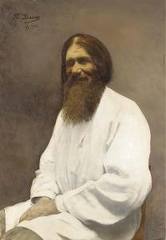Excerpts
Excerpts from Rasputin and The Jews: A Reversal of History by Delin Colón
Introduction
This small tome is intended to vindicate Grigory Efimovitch Rasputin (born approximately 1870; died 1916), spiritual advisor to the last Tsar and Tsarina of Russia. It means to debunk all of the outrageous rumors perpetrated by a bigoted, small-minded, self-absorbed society. If you are looking for a list his debauchery, sins, or crimes, you won’t find them here, for there exists no evidence of those, other than rumors. If you’re seeking the gory description of his brutal murder, you won’t find it here. And if you want to establish a link between Rasputin and the fall of the Romanov Empire, you won’t find any, because there is none.
What you will find is testimony from many who knew him, including his enemies, regarding his humanitarian activities. You will find accounts of his aid to the poor and the ill and his endless efforts to avoid war and its needless cost of lives. You will find substantial evidence of his aid to Russian Jewry and his attempts to obtain equal rights for this group, which was Russia’s most severely oppressed and restricted population.
But, most of all, you will find that what has passed as history for a century was not the truth, which exemplifies how history is written by the powerful not by the oppressed.
Chapter 1 – Purpose
Grigory Efimovich Rasputin-Novy has been unfairly maligned for nearly a century, and all because history is written by the politically powerful to whom it was beneficial to record the rumors, myths and exaggerations surrounding this controversial figure. The people Rasputin helped – the underdogs of society, the Jews, peasants, and poverty-stricken – were not in a position to speak up or even to be believed. Just as Russia wanted to blame the Jews for its ills and lost battles, so did they want to blame Rasputin, rather than the weak-willed Tsar Nicholas II, for the downfall of the Romanov Empire. The long perpetuated image of Rasputin is of a man who committed evil for the sake of evil alone. Naturally, the largely anti-Semitic aristocracy would think it evil to champion the cause of the oppressed Russian peasants and especially the Jews.
Although most records of his good works and petitions were destroyed by his allies to avoid persecution by the tsarist government or the Provisional Government that followed it, some accounts of his efforts can be found in the memoirs of his Jewish secretary, Aron Simanovitch, in the biographies of her father by Marya Rasputin, in the memoirs of Mme Vyrubova (the Tsarina’s lady-in-waiting) and General Spiridovitch (Chief of the Tsar’s secret police), and in Edvard Radzinsky’s “The Rasputin File”, among many others.
Both Rasputin’s daughter and secretary, in addition to numerous others, describe him as a man of God, as an empathic and herbal healer, as a man of peace wishing to avoid war at all costs, and as a champion of equal rights for all Russian citizens, regardless of their faith or background.
Simanovitch’s account is often discredited due to the inclusion in his memoirs of bizarre court gossip and exaggeration of his own importance in the court, although the cases of Rasputin aiding Jews are substantiated by many reliable sources and are indisputable. Simanovitch has also been dismissed because, although he was a jeweler, he also ran gambling parlors. And he has been disregarded because he was a Jew who, through his ten year association with Rasputin, had to resort to bribing officials to save the careers, families, homes, educations, and lives of countless Russian Jews who, at that time (and for centuries before) were denied basic human rights.
Before moving to Saint Petersburg, Simanovitch and his family lived in Kiev where he owned a jewelry store. In 1905, as in many other times and places, the military conducted a pogrom (an organized massacre of Jews and destruction of their homes and property) in Kiev. Simanovitch had been in St. Petersburg at the time, but rushed back to Kiev. His shop was ransacked, but his immediate family was spared, owing to the fact that he paid the chief of police for protection. As he and his family were given safe conduct out of Kiev, he was shaken by the sight of his dead friends and neighbors who’d been slaughtered outside the synagogue after a holy service. He saw corpses, burnt houses and broken windows. At that moment, he vowed to do what he could to acquire equal rights for Jews and abolish this terror. He saw his association with Rasputin as a means to this end.
In order to understand who the truly evil ones are, and the underlying causes of Rasputin’s benevolence to Russian Jews, we need to take a brief look at how tsarist Russia treated its Jewish population.
Chapter VIII – Rasputin’s Politics
Despite the Tsar’s anti-Semitism and constant complaints about and paranoia of Jews, as well as his membership in the League of Russian People, which ordered the pogroms, Rasputin became a friend and protector to the Jews and supported Simanovitch’s efforts toward equal rights. He did not openly attack the anti-Semitic organizations which the Tsar supported, but didn’t hesitate to point out their faults to him. This is part of the ‘terrible’ and ‘evil’ influence that the nobility feared Rasputin had over the Tsar. In addition, it’s evident that Rasputin’s influence over the extremely anti-Semitic Tsar was minimal in this arena. However, he kept trying to sway the Tsar’s opinion, again, at great risk to his own position.
Rasputin dreamed of a monarchy where the peasants formed the dominant ruling class. He felt that state and church lands should be shared with the peasants, especially the nomadic ones. But, above all, he wanted the peasants to have political influence equal to that of the nobility. He was actively interested in the problems of all minorities in the country, having come to know many of them in the course of his pilgrimages. He saw German colonies, Tartar villages, Polish Jews, Georgians and Armenians. He energetically took on the cause of oppressed people.
“We are all equal in front of God,” he used to say. He was for the abolishment of all restrictions on minorities and hoped to realize this goal once the war ended. Fuhrmann corroborates Rasputin’s sympathy for other faiths and finds it remarkable that he became an outspoken advocate for equal rights for Jews, at a time when this cause was so unpopular.
Chapter IX – Protector of the Jews
Rasputin always came to the defense of those persecuted because of their faith, whether members of various sects, Muslims or Jews. Simanovitch, his secretary, tells of many incidents where he called upon Rasputin to come to the assistance of Russian Jews (author Radzinsky alludes to these, but does not give specifics, while many other authors substantiate the details). In 1915, Russia’s numerous defeats in the war against Germany were blamed on the Jews, who were assumed to be spies. It was a dangerous time for Jews to be in the military (or anywhere) and, through Rasputin, Simanovitch managed to exempt many Jews from serving in the army.
Accusations of espionage needed no proof, such as in Dvinsk where several Jews were hanged for spying, but were later found to be innocent. Many Jews, at this time, were being evicted from St. Petersburg, but Simanovitch thwarted many of these cases by having Rasputin appeal to the Tsarina.
Exerpts from the Conclusion, at the end of the book:
Many erroneously believe that Rasputin single-handedly caused the fall of the Romanov Empire. Roullier asserts that it is impossible for one man to cause the fall of an empire without concurrent historical, economic and sociological conditions already in play. In addition, the Tsar generally didn’t follow Rasputin’s common sense advice such as reducing the price of meat and bread, prioritizing shipments of food to the capital, and pulling counterfeit currency from circulation. In any case, his recommendations were motivated by the best of intentions – to save the monarchy and Russia.
In 1907, a French war correspondent covering Russia met with Suvarin, director of New Times (Novoe Vremia) newspaper, who stated, “All of our problems stem from the Tsar and only the Tsar … this man has been fatal to Russia and more catastrophes await us under his rule.”[1]
Kerensky, who was a lawyer and, after the revolution, head of the Provisional Government, declared, “What connection…could exist between the war, the Russian Revolution, the fall of the monarchy, and Rasputin? None! …the causes of the Russian Revolution are multiple and complex.”
Toward the end of 1916, revolution was in the air, with the increasing dissatisfaction and hunger of the population. Rasputin’s many recommendations for avoiding revolution, with regard to rations, aid to the peasants, redistribution of land, and giving rights to minorities, were never followed. The result was strikes and mass killings. Many warned the Tsar, including his mother and the British Ambassador, that he needed to return to the capital to attend to these problems, but he persisted in staying at general headquarters.
Author Andrei Amalrik finds that if Rasputin’s agrarian program of expropriating land from the aristocracy, with compensation, and distributing it among the peasants had been instituted, there would not have been a revolution. If, as Rasputin had advised, the transport of food to hungry Russians and the end of the black market had been a priority, this would have decreased the discontent of the general population. In its absence, it predisposed the people to revolution. Bringing an end to discrimination against Jews and giving them full rights and citizenship, which Rasputin worked for, also could have helped avoid a revolution. Even without considering previous centuries of discrimination, the systematic pogroms terrorizing the Jews during the war played an important role in the revolution. According to Amalrik, all of Rasputin’s programs would have been a viable means of averting the 1917 revolution. In fact, he points out that Lenin instituted many of these, giving land to the peasants, making peace with the Germans and according full rights to the Jews. On March 21, 1917, the Provisional Government abolished all religious and ethnic restrictions, granting Jews and other minorities equal rights.
When the published accusations against Rasputin became numerous, the journalist G.P. Sazanov often proposed attacking this or that publication. Many of Grigory’s allies were upset that he never responded to any accusations. Rasputin’s response was always, “Remember, my friend, how our Savior suffered. Next to that, my worries are nothing. May God pardon them.” Marya Rasputin tells that when her father was shown a hostile article in the newspaper, he would generally laugh and say, “Well, journalists have to earn a living.”
But this is what it boils down to, in very simple terms: while the Romanovs were responsible for the slaughter of numerous Jews, peasants, Armenians, Tartars and Georgians, Rasputin never harmed nor killed a single human being, and even forgave those who tried to assassinate him. That said, it’s ironic that the Romanovs are deified while Rasputin is vilified. The fall of the Romanov Empire was more a tragedy for the aristocracy than the common man.
As for Simanovitch, some regard him as a criminal (although no particular crimes are ever cited) merely because the Tsar’s secret service described him so. It is true that, in addition to being a jeweler, he ran a gambling parlor, but that establishment was frequented largely by the nobility and government officials. It seems that the only ‘crime’ he committed (other than spreading or fabricating court gossip in his memoirs, as was widespread practice among the nobility) was that of circumventing unjust laws, in order to aid the oppressed and disenfranchised Jews, and the poor in general.
At the end of his memoirs, Simanovitch leaves us with a memorable eulogy for his friend Grigory Efimovitch Rasputin:
“I never saw him do anything evil or wrong. In fact, his mission was to be good to everyone. If Nicholas II was a bad tsar, Rasputin was not to blame. With my assistance, he helped thousands of people, with a real and sincere goodness, and no personal profit involved. Numerous were those he saved from misery, death, humiliation and suffering. This I will never forget.”
And neither should we.







 The Accidental Anarchist
The Accidental Anarchist Gates of Eden by Charles Degelman
Gates of Eden by Charles Degelman





